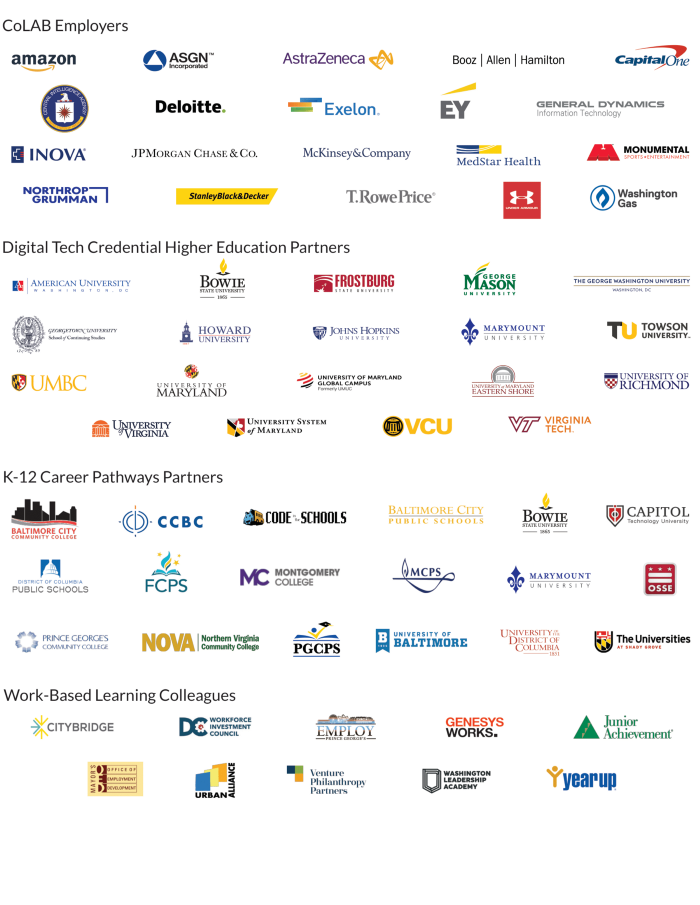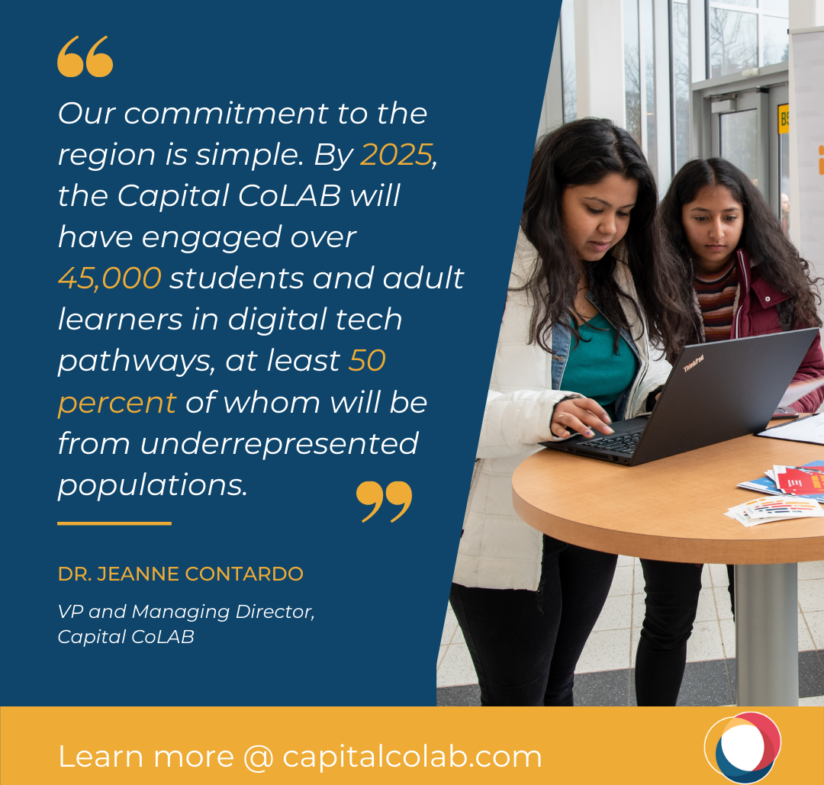The Capital Region is crisscrossed by a series of social, economic, and geographic boundaries. While its footprint — stretching from Richmond, through Washington, DC, and over to Baltimore — has the third-largest economy in the United States and the high aggregate education attainment rates and income levels you might expect, you don’t have to look very deep to see the inequalities that also exist. They appear along the traditional cracks in our social fabric that we have come to recognize: race, income, education level, and gender.
The Greater Washington Partnership (“the Partnership”), a civic alliance of leading CEOs from the region’s largest employers, was created in 2017 to ensure that the Capital Region is the best place to live, work, and build a business, driving regional unity and solutions. Talent is a core driver of this future state, and the Capital CoLAB (the “Collaboration of Leaders in Academia and Business”) was established to ensure our region has a comprehensive and equitable strategy to ensure that all people — regardless of their zip codes — are able to participate in our vibrant and thriving economy. In 2020, as we fight the dual pillars of systemic racism and an economy devastated by COVID-19, our vision of inclusive growth has taken on even greater urgency.
When the Capital CoLAB was founded in 2018, digital tech talent rapidly crystallized as the talent pipeline on which to focus, representing both a VERY in-demand category of jobs (we project over 60,000 unfilled jobs annually in our region through 2025) and a set of occupations that are skill-driven with multiple on-ramps and off-ramps. For those of us in the talent development world, this translates into a diverse set of jobs that can appeal to — and offer career growth for — a diverse group of people, in turn creating the foundation for a healthy and equitable growth economy.
Our commitment to the region is simple. By 2025, the Capital CoLAB will have engaged over 45,000 students and adult learners in digital tech pathways, at least 50 percent of whom will be from underrepresented populations.
While the commitment is simple, our work is complex and relies on the joint commitment of our many partners to lean into our intent to ensure the Capital Region has the most diverse digital tech workforce in the country. Our programs span K12 school districts, community colleges, universities, and large employers who are all working to ensure that the Capital Region offers pathways to digital tech employment while expanding and diversifying the learners who pursue it. Key elements include:
- The CoLAB Digital Tech Credential program. With enrollment just beginning to ramp up, today we have 760 students from across 15 Capital Region universities taking courses that are aligned to employer-identified digital tech knowledge, skills, and abilities (KSAS), ensuring that students’ learning matches workforce needs. Forty-six percent of our students are female.
- K-12 Career Pathways/TalentReady Program. In partnership with 5 jurisdictions across the region, public school districts, community colleges, and universities are engaging in the hard alignment work to build in-demand digital tech pathways that pay a family-sustaining wage. The CoLAB’s Employer Signaling System clarifies the knowledge, skills, and abilities needed and also offers data on various digital tech occupations. The CoLAB has received $6.9 M from JP Morgan Chase and Bloomberg Philanthropies to support jurisdictions in this work.
- Work-Based Learning with an Equity Lens. In addition to aligning curricula with digital tech fields, we must also offer opportunities for learners to apply their competencies in professional settings. Too often, these work-based learning experiences (internships, job shadowing, mentoring, apprenticeships) are structured in such a way that participation is hampered. We are collaborating with our colleagues across the region to build a scaled work-based learning ecosystem that ensures all students receive the chance to apply their learning and demonstrate to employers their knowledge, skills, and abilities.
As we use the next four years to deliver on our promises to the region, our work will be driven by our values: placing diversity, equity, and inclusion at the center of our work; acting with bravery, risk, and integrity; embracing transparency and accountability, and avoiding unnecessary duplication across the region.
I often say that if this work were easy, we would have done it already. Creating change requires thinking differently about seemingly intractable problems and striving for inclusive outcomes. Our partners’ willingness to engage in this unchartered territory inspires me daily. The work of building new structures and relationships can be inherently risky and challenging but especially in 2020, the potential rewards have never felt more meaningful. As we imagine a region that places inclusive growth at the center of our efforts, as we imagine an inclusive recovery where no one is left behind, as we imagine harnessing the strength in our region to remove the social, economic, and geographic boundaries that exist — I invite you to join us and help us create talent pipelines that ensure everyone can live, work, and build a business, equitably.
You can reach us at [email protected].


